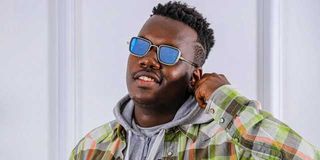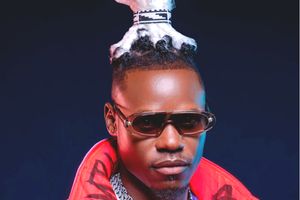
Gospel rapper Ranja Mistari (real name Karanja Njenga) has talked about staying grounded in faith and fame, the myths surrounding gospel rap and why he’s not in a rush to sign with a major label.
Who is Ranja Mistari?
A music creative from Ongata Rongai. I like to call myself an international artiste. They say people from Rongai are already in the diaspora, ha ha. I fell in love with music from the very beginning. I grew up in a Christian household—my sister had a laptop filled with hip-hop and gospel albums. So I was listening to artistes like Lecrae and Tedashii. Then around 2007 to 2009, Eko Dydda started coming up. I was that curious child who always wanted to know what was happening in the music scene. One day, I heard Eko Dydda and another artiste called MC Dice, who was also from Rongai.
I went to one of their shows and instantly knew—this is what I want to do. I started pursuing music from a young age, even though I couldn’t write my own lyrics yet. I’d memorise their songs and rap them to other children, claiming them as mine—because honestly, no one my age was listening to Eko Dydda back then.
How did a kid from Ongata Rongai end up choosing gospel rap?
Honestly, I feel like I didn’t have much of an alternative growing up. Gospel rap was all I knew—it was the only path that made sense to me at the time. But now, I feel like I’ve evolved. You can’t box me in and just say “gospel rapper.” I’ve grown into a more diverse artiste. I’ve got songs and even an album that talk about the hustle, the grind, and chasing dreams. So I’d say I’m a Christian who makes music—not necessarily limited to gospel rap.
Tell us about your Christian background
I grew up with all my five sisters, I'm the last born, and our mum was a staunch Christian. We always went to church together as a family. That’s the kind of foundation I had growing up.
When did music stop being just a passion and start looking like a career path for you?
I think it really hit me during the COVID days. I got a gig, and even before I showed up, they sent me some good money. That was a turning point, it felt like a new leap. That’s when I realised this could actually be a career. Of course, from the start, I knew it would take time before the money came in, but I was ready for the long haul.
And honestly, even the things I'm doing now are by-products of music. Someone might see me perform and say, “Come emcee this event,” or “Come speak to these children.” Especially during school holidays, I find myself talking to young people about art, talent, and self-expression. Gospel rap isn't the easiest genre to break into, but it's opened doors I never expected.
What was the biggest challenge getting people to take you seriously?
Growing up in Rongai, people didn’t know I could rap. So, I started doing shows there, and at first, people were like, “Ah, msanii msanii." The hardest part was people getting people to stop calling me by the name I grew up with. It felt like a struggle to get any real recognition. Even my immediate family didn’t see me as an artiste at first. Some of my friends even laughed at my first songs. It was tough, but I kept pushing. But now they don’t have a choice, they’ve seen the progress, and they’ve caught on.
Was there a moment when you felt like quitting or switching lanes because things weren’t just working?
Yeah, there were definitely times when I felt like giving up. I didn’t get into music for the money, honestly. But God has always provided, even when it seemed tough. I look back now at the times when there was no money coming in, and I was struggling just to pay for studio sessions and producers.
There were moments when I thought, “Maybe I should just stop.” It was tough, but I kept pushing forward. I realised that in 100 days, I could have 30 really good days. That gave me the motivation to keep going.
You rap about miracles and faith. Have you personally experienced moments where faith carried you through tough times?
I have a song called “Miracles”. It doesn’t just focus on the obvious miracles, like a blind person seeing. The Bible talks about the greatest miracle being someone saved, someone being transformed from darkness to light. That’s the biggest miracle, and that’s what my song is about: how God saved me.
Tough times do come, even for Christians, but I believe that God is my hope. Whenever things aren’t going well, when things don’t align, I trust in Him, knowing that things might not get better, but it's all part of His will.
Do you think gospel artistes are sometimes expected to be ‘too perfect’?
I feel like everyone is flawed. We’re naturally sinful—we’re born into sin. But somehow, we expect perfection from imperfect people. We all struggle with things that most people don’t know about.
I have a friend I’ve worked with on a song, and at times, people throw stones at him because of the changes he’s made. But they don’t know his journey, they don’t know that he's standing right now with the Lord. If your first reaction to someone acting out is to point fingers instead of praying for them, then that’s not Christ-like.
How do you handle the business side of your music?
I had a team earlier on, but right now we’re in a phase of figuring things out. I’m trying to bring in professional management and PR teams. We’re in talks with a few people, so we’ll see how that goes. But for now, I’m handling it myself.
Would you sign with a major label if they approached you?
My question to the label would be: What are they bringing to the table? If a label promises me media placement, I’d think, “I can do that on my own if needed.” It really comes down to what they’re offering.
For example, I had a song, Cruising Nicely, hit 500,000 views on TikTok just because I posted it there. If a label can’t promise me something I can’t already do myself, I’ll just pass. And also, how much are they taking from me? I don’t want to find myself 50 or 60 years down the road saying, “They took all my money.” These days, even five years later, you hear artists complain, “I got signed, and now I’m left with nothing.” I’m very cautious about that.
You called your EP ‘Man on a Mission’. So what’s the bigger mission?
I’m trying to paint a picture of hope and faith in Jesus for my audience. It’s about showing that you can live life with faith. You don’t have to see God as someone who’s angry at everything you do. God is a loving figure who understands our daily struggles. Hebrews says we don’t have a high priest who is unfamiliar with our suffering. So, my goal is to help people love God, hate sin, and embrace faith, all while incorporating humour. There’s humour, happiness, and joy in God.
When the money starts coming in, what's your one weakness or indulgence?
As someone who loves goats—I'm a GOAT myself—I'll probably spend a lot of time in my Kajiado home, looking to buy more goats. I just want to escape the noise of the town and find peace away from it all. My plan is to build a house, get livestock, and just live that simple life with animals around. I’d also love to get a car right now; that's definitely something I need.
What would you tell your younger self?
It’s going to work out. Stop being afraid. Stop being anxious. Stop fearing failure. Just go for it.
What's your parting shot?
Right now, I'm at a place where I'm becoming more visible. I'm getting airplay, and when I walk in town, a few people recognize me. My goal is to keep pointing people to Christ, having fun with this journey, and helping people appreciate Kenyan music and content.






